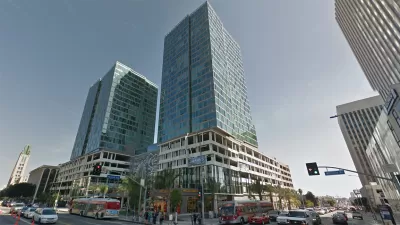For the first time since 1946, Los Angeles is completely revising its zoning code. Urban Insight, the team behind Planetizen, is pleased to be part of this project. One of our key goals is to create a modern web-based version of the zoning code.
For the first time since 1946, Los Angeles is completely revising its zoning code. This effort is called re:code LA.
Background
The City's zoning code is used to guide where and how we build in Los Angeles. Adopted 67 years ago, the current zoning code has grown from a simple, 84-page pamphlet to an unwieldy, 600+ page book with legal-sounding descriptions that make it difficult to understand what kind of development is allowed, and how to get a project approved. The current code is difficult for an expert to decipher, let alone a member of the public.
The new zoning code will reflect the diversity of Los Angeles, allowing each neighborhood to maintain a distinct sense of place while improving the sustainability, economic vitality, and quality of life for its residents.
Urban Insight is the technical and editorial team behind Planetizen. We're excited to be involved with this historic effort, working alongside lead consultant Code Studio, the LA Department of City Planning, and a variety of other world-class consultants.
Our Goal
 One of Urban Insight's goals in this project is to create a modern web-based version of the zoning code. We envision an interactive code that can be personalized for the reader, published as a printed book, displayed in a browser or smartphone, or viewed as an ebook.
One of Urban Insight's goals in this project is to create a modern web-based version of the zoning code. We envision an interactive code that can be personalized for the reader, published as a printed book, displayed in a browser or smartphone, or viewed as an ebook.
One of the key aspects of the new web-based zoning code is to personalize the code for any individual visitor. A resident adding on to her home is likely to need different sections of the zoning code than a business owner interested in opening a new restaurant or a landlord who wants to renovate an apartment complex.
By answering a few simple questions about what you’re trying to achieve, and optionally, your address, we hope to deliver a customized version of the zoning code that offers a streamlined version with just those sections you will need. Of course, you'll still be able to access and search the full zoning code as well.
System Architecture
Technically, our goal is to define a system architecture that will enable the new, beautifully-illustrated zoning code to be printed in its entirety as a book. The architecture will also need to manage discrete units of usable content such as images, interactive elements, tables and charts, so that the content can be dynamically combined to create personalized versions of the document. These units will need to be re-assembled to enable publishing across multiple channels, such as a browser, tablet, mobile device, app, ebook, or — importantly — in formats that we are only beginning to envision — such as Google Glass.

Alabama: Trump Terminates Settlements for Black Communities Harmed By Raw Sewage
Trump deemed the landmark civil rights agreement “illegal DEI and environmental justice policy.”

Study: Maui’s Plan to Convert Vacation Rentals to Long-Term Housing Could Cause Nearly $1 Billion Economic Loss
The plan would reduce visitor accommodation by 25% resulting in 1,900 jobs lost.

Planetizen Federal Action Tracker
A weekly monitor of how Trump’s orders and actions are impacting planners and planning in America.

Waymo Gets Permission to Map SF’s Market Street
If allowed to operate on the traffic-restricted street, Waymo’s autonomous taxis would have a leg up over ride-hailing competitors — and counter the city’s efforts to grow bike and pedestrian on the thoroughfare.

Parklet Symposium Highlights the Success of Shared Spaces
Parklets got a boost during the Covid-19 pandemic, when the concept was translated to outdoor dining programs that offered restaurants a lifeline during the shutdown.

Federal Homelessness Agency Places Entire Staff on Leave
The U.S. Interagency Council on Homelessness is the only federal agency dedicated to preventing and ending homelessness.
Urban Design for Planners 1: Software Tools
This six-course series explores essential urban design concepts using open source software and equips planners with the tools they need to participate fully in the urban design process.
Planning for Universal Design
Learn the tools for implementing Universal Design in planning regulations.
Caltrans
Smith Gee Studio
Institute for Housing and Urban Development Studies (IHS)
City of Grandview
Harvard GSD Executive Education
Toledo-Lucas County Plan Commissions
Salt Lake City
NYU Wagner Graduate School of Public Service




























